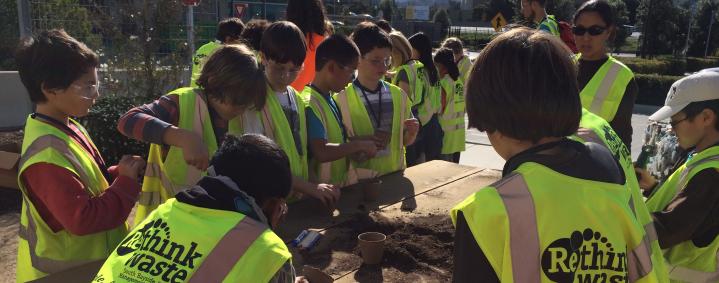RethinkWaste is a joint powers authority of 12 public agencies in San Mateo County, Calif., that delivers innovative waste reduction and recycling programs.

In response to the state of California’s mandate to divert organic waste from landfills, the South Bayside Waste Management Authority (SBWMA), also known as RethinkWaste, was looking to find solutions for its 12 public agencies that could deliver results in an efficient, effective and affordable manner, to work with its solid waste services provider, Recology.
“We have an obligation to our rate payers to improve productivity and efficiency,” says Joe La Mariana, executive director of RethinkWaste, based in San Carlos, Calif. “When technology is presented to us we are very intrigued. We want to try it in the field in real applications.”
RethinkWaste is a joint powers authority of 12 public agencies in San Mateo County, Calif., that delivers innovative waste reduction and recycling programs.
Recently, RethinkWaste was presented with container monitoring software for waste haulers from San Francisco-based Compology and opted to conduct pilot testing of the company’s cart sensors and software. The agency-wide pilot involves the use of 400 in-container camera sensors to remotely record the volumes and utilization of select commercial carts and bins for those accounts that are subject to the mandatory organics requirements, as stated in recent California laws AB 1826 and AB 1383.
These units are being installed this month and field data will be captured in December and January. Compology will provide a final report with their findings and recommendations by March, which will be reported to the RethinkWaste board in April. The pilot targets commercial entities like grocery stores, restaurants, tech campus food service centers, etc.
The group “selected Compology’s technology to collect abundant, accurate and up-to-date data on containers within its jurisdiction knowing that technology could help automate tracking of waste practices and measurement of diversion goals,” says Compology CEO Jason Gates.
RethinkWaste intends to use the location, fullness and service verification data, along with content visibility from Compology to set a baseline for current performance in their areas of operation. Once a baseline is established, RethinkWaste can then make data-driven decisions on how to comply with state mandates.
“Best case scenario is that we find significant production efficiencies by using this technology,” says La Mariana. “We are using it out in the field to see if it can be expanded agency-wide.”
But La Mariana isn’t sure the RethinkWaste and its waste hauler, San Francisco-based Recology, can get any more efficient.
“In the past year and a half, we have done operational analyses on how efficient Recology’s services are and also peer-reviewed them” he says. “They are operating in a very highly efficient manner. I don’t know if there is a lot more operational efficiency to be gained, but it sounds intriguing to us.”
Through daily, automatic monitoring of containers within RethinkWaste’s service area, Compology’s sensors will allow RethinkWaste and its hauler, Recology, to eliminate manual waste audits, says Gates.
“Until now, there’s been no choice but to rely heavily on manual and costly audits for measurement and oversight (often done once or twice per year, at best), but with Compology’s sensors, RethinkWaste can now have real-time and historical fullness and content data automatically collected and recorded (daily) on every container, and easily access it through a web-based software at any time,” he says.
They also will be able to monitor generator waste behavior. Part of meeting the state mandate is making sure generators are disposing of waste in the right bins. With the sensors’ images and ability to tie a container to a specific generator, RethinkWaste and Recology can see how each customer location is performing in terms of utilizing containers and services to meet mandates.
By analyzing the collected data and the images, RethinkWaste and Recology also can identify which generators are improving their diversion practices and which are not, and in turn, develop targeted outreach and education campaigns with information relevant specifically to each location.
“It gave us peace of mind that the technology is proven and want to see how it applies in our setting,” says La Mariana. “We are hopeful to see the final results.”
According to Gates, there is an increasing onus on businesses and governments to do their part in addressing environmental sustainability.
“(RethinkWaste) is a pioneer when it comes to implementing technology in the waste industry to address these challenges, because they not only understand that this shift is inevitable, but also that IoT technology, like Compology, is ready and affordable for use today,” says Gates.
About the Author(s)
You May Also Like


